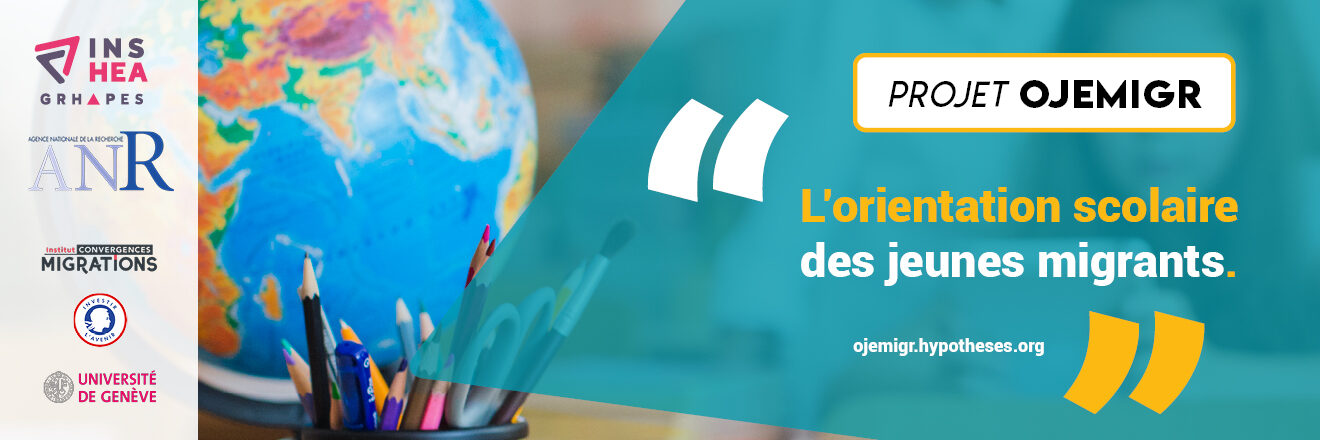L’objectif du projet est d’analyser la construction de l’orientation scolaire post-troisième des jeunes primo-migrants dans le système éducatif français : production de discours institutionnels, pratiques des collégiens et adultes intervenant auprès d’eux. Ceci suppose de s’intéresser aux différentes étapes de l’orientation, depuis la première évaluation passée au vécu de l’orientation durant les deux années qui la suivent. Il importe de s’intéresser aux interactions entre les producteurs de normes et de procédures afférentes à l’orientation (acteurs de l’orientation de l’Éducation nationale, collectivités territoriales, secteurs associatifs mais aussi logiciel dédié) et aux jeunes et familles qui la vivent tout en participant eux-aussi à l’édification de référentiels normatifs. Dans cinq académies, notre méthodologie, mixte, combine suivi qualitatif d’une cohorte de 20 jeunes (110 au total) pendant trois ans, analyses statistique des données scolaires et du logiciel utilisé pour l’orientation. De plus, afin de saisir les ancrages et ressorts de la construction des décisions afférentes à l’orientation mais aussi leur forme de légitimation et leurs appropriations subjectives par les personnes et notamment par les élèves, nous étudierons aussi la production règlementaire et les modalités de recours des élèves et leur représentants légaux et ceci sur trois années scolaires : l’année de troisième et les deux années suivantes.
Synthèse et axes d’analyse :
Nous pouvons retenir 3 axes d’analyse pour organiser notre enquête et traiter nos données :
- Étude des parcours : Déconstruction et restitution des parcours longitudinaux permettant de saisir les différentes étapes et structuration relatives de l’orientation
- Légitimation : Étude des registres de légitimation des normes et positions scolaires ; permettant de comprendre la structuration des décisions et régimes de justification ;
- Appropriation : Étude des formes de réactions sociales et de subjectivations des acteurs éducatifs et des jeunes.
Young migrants’ educational guidance : project summary
The aim of the project is to analyze young migrants’ educational guidance as a social construction in the French education system. This implies working on institutional rhetoric and discourse, practices of students and adults who work with them. We need to focus on the several steps of the guidance from their entry into the French school system in ninth grade up to two years later, at the end of eleventh grade. This research requires to pay attention to the interactions between the producers of norms related to guidance (educational teams in middle-schools, local authorities, associations but also the computer software used in the educational guidance process, and the young people and their families who also take part in building some norms in this field. In each of five regional education authorities, we will use mixed methods to follow-up a cohort of 20 young people (110 in total) for three years, as well as statistical analysis of school data and of the guidance’s computer software. Moreover, in order to fully understand how the decisions relating to guidance are constructed, legitimized and subjectively appropriated by social actors, particularly pupils and educational teams, we will also study the regulatory production and the recourse conditions for pupils and their legal representatives over three school years –ninth grade and the two following years.
Synthesis and lines of analysis :
Our survey and data processing will be organized along 3 lines:
- Study of the educational pathways: deconstruction and restitution of the longitudinal pathways allowing to seize the various stages and relative structuring of the guidance
- Legitimization: study of the types of legitimization of school norms and positions, allowing to understand how decisions and regimes of justification are structured
- Appropriation: study of the forms of social reactions and subjectivations of educational actors and young people.

